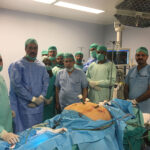Gastric bypass surgery is one of the most commonly performed bariatric procedures. But how does it work, and why is it so effective in helping individuals achieve lasting weight loss? In this article, we’ll delve into the science behind gastric bypass surgery to provide a comprehensive understanding of its mechanisms and outcomes.
The Mechanics of Gastric Bypass Surgery
Gastric bypass surgery, also known as Roux-en-Y gastric bypass, involves several key steps:
- Stomach Pouch Creation: The surgeon creates a small pouch at the top of the stomach, effectively reducing its capacity to hold food. This limits the amount of food a person can eat at one time.
- Rerouting the Digestive Tract: The small intestine is divided, and the lower part is attached to the newly created stomach pouch. This rerouting reduces the absorption of calories and nutrients from food.
The Impact on Metabolism
One of the fascinating aspects of gastric bypass surgery is its impact on metabolism. The altered anatomy of the digestive system affects hormones and metabolic processes in the body. Some of the key changes include:
- Ghrelin Reduction: Ghrelin, a hormone that stimulates hunger, is reduced after gastric bypass surgery. This contributes to reduced appetite and food intake.
- Insulin Sensitivity: Many patients with type 2 diabetes experience improved insulin sensitivity after surgery, often leading to better blood sugar control.
- Rapid Weight Loss: The combination of reduced food intake and altered metabolism results in rapid weight loss, especially in the first year following surgery.
Long-Term Health Benefits
The benefits of gastric bypass surgery extend beyond weight loss. Many patients experience improvements in obesity-related health conditions such as:
- Type 2 Diabetes: A significant percentage of individuals with diabetes see remission or improvement in their condition after surgery.
- Hypertension: High blood pressure often improves or resolves, reducing the risk of heart disease and stroke.
- Sleep Apnea: Sleep apnea symptoms can diminish or disappear after surgery, leading to better sleep and overall health.
The Importance of Lifestyle Changes
While gastric bypass surgery is a powerful tool for weight loss and health improvement, it’s essential to emphasize that it is not a magic solution. Successful outcomes require long-term commitment to lifestyle changes, including:
- Dietary Modifications: Patients must adhere to a strict post-operative diet and gradually reintroduce solid foods.
- Regular Exercise: Physical activity is crucial for maintaining weight loss and overall well-being.
- Follow-Up Care: Ongoing follow-up with healthcare providers ensures that any issues are addressed promptly, and progress is monitored.
In conclusion, the science behind gastric bypass surgery is a complex interplay of anatomical changes, hormonal shifts, and metabolic adaptations. It offers a powerful solution for individuals struggling with obesity and related health issues, but success hinges on a holistic approach to lifestyle modification and long-term commitment.






